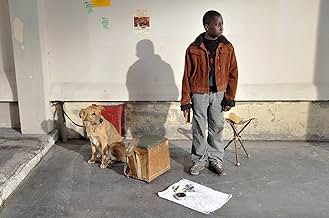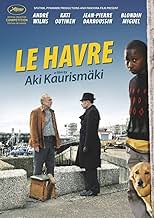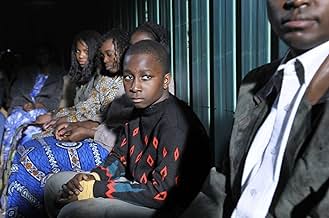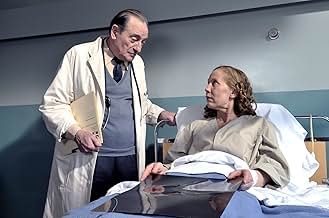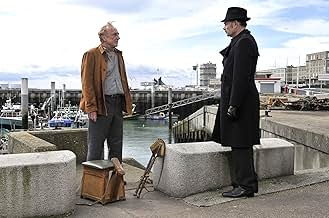VALUTAZIONE IMDb
7,2/10
24.754
LA TUA VALUTAZIONE
Quando un ragazzino africano arriva su una nave da carico nella città portuale di Le Havre, un anziano lustrascarpe prova pietà per lui e lo accoglie in casa propria.Quando un ragazzino africano arriva su una nave da carico nella città portuale di Le Havre, un anziano lustrascarpe prova pietà per lui e lo accoglie in casa propria.Quando un ragazzino africano arriva su una nave da carico nella città portuale di Le Havre, un anziano lustrascarpe prova pietà per lui e lo accoglie in casa propria.
- Premi
- 15 vittorie e 34 candidature totali
Quoc Dung Nguyen
- Chang
- (as Quoc-Dung Nguyen)
Little Bob
- Little Bob
- (as Roberto Piazza)
Recensioni in evidenza
(Read the full review at http://nickplusmovies.blogspot.com)
I started off my experience at this year's Toronto International Film Festival with Aki Kaurismäki's "Le Havre", a rather obscure, small production that was competing for the Palme d'Or at Cannes (it was Terrence Malick's "The Tree of Life" that was the big winner). The question is: Did I start off on the right foot? Read on to find out...
"Le Havre" centers on an elderly, working-class shoe shiner named Marcel Marx (played by André Wilms), living with his loving wife Arletty (Kati Outinen) in the French port city of... Le Havre. Although his profession only leaves him with enough money to get by, he never gives up hope and always finds great joy and warmth in all the people in his life-- be it his friendly, selfless, next-door neighbor or the kind owner of the local bar. Marcel's life takes a bit of a turn when he must send his ill wife to the hospital, hoping she will get better soon. But that's not it-- soon after, when he finds himself alone, eating a sandwich at the harbor, he discovers a young African boy named Idrissa (Blondin Miguel) hiding in the water. Marcel befriends him and learns that he had been hiding with many other illegal immigrants in a shipping container, with hopes of arriving in London to meet up with his aunt. The old man voluntarily goes out of his way to keep him away from authorities and completely out of sight, but soon, this situation quickly transforms into a cat-and-mouse game, lead by the persistent, intimidating, wolf- like police inspector Monet (Jean-Pierre Darroussin).
With its simplistic plot, clearly defined characters, and inviting setting, this film has all the qualities and characteristics of a great short film-- if you don't count its feature-length runtime. Is this a bad thing? Hardly! I find that this makes the film all the more absorbing and enjoyable, though slow in progression at times and thus able to make your average modern-day moviegoer lose interest. But I still believe that sometimes, it's nice to just sit down and follow a naturally flowing, straightforward story, when most of the movies you see today are flashy and overly stimulating to the point where they bore you. "Le Havre" is something refreshingly different, for a change.
Rarely do films combine comedy with drama in such a natural, uncontrived way. With this film, Aki Kaurismäki proves to be one of the few working directors able to pull off a mixture of dark, ironic, and deadpan humor while maintaining the same upbeat, cheerful, and optimistic tone throughout the entire film. A great example of this guy's exemplary sense of humor is the opening scene of the film, where we see Marcel going around with his shoe shining materials, looking for a paying customer. He finally lucks out when he approaches a suspicious looking type holding a suitcase in his hand. As he shines this man's shoes, we see two other mysterious figures watching from a distance. It's clear that something's up. When Marcel finishes his job, the man pays him and quickly tries to escape. But it's too late; we hear gunshots, a tire squeal, and a scream as the camera lingers on Marcel, whose facial expression remains pleasant. He simply says: "Luckily he had time to pay.". Of course, since it's more of a visual gag, it's much funnier when you see it for yourself. Having said that, there's no denying that this film has very smart comedic elements.
What I love just as much-- if not, more-- about this little film is how authentic and down-to-earth the characters are in their interactions. Every scene is made into such an accurate portrait of life thanks to all of the real, human performances from the entire cast of lesser-known actors. The only thing that threw me off was how the couple of Finnish actors in the film let their accents slip through as they were speaking French. But this would be barely noticeable for those of you who don't speak either one of these languages.
Although this film is Finnish, it's obvious that it's shot on location in France. I was breathless as I got to admire the beauty of the ocean and the quaint coziness of the old city buildings. Sadly, this is the closest I've ever gotten to visiting France! No wonder these sights took me away.
In sum, Aki Kaurismäki's "Le Havre" is a simple, human tale that remains light and pleasant while brushing on topics of illegal immigration and the illness of a loved-one. It's a soulful film that mixes smart humor with true emotion, without ever feeling artificial. I recommend looking for this hidden gem. You might just like it.
I started off my experience at this year's Toronto International Film Festival with Aki Kaurismäki's "Le Havre", a rather obscure, small production that was competing for the Palme d'Or at Cannes (it was Terrence Malick's "The Tree of Life" that was the big winner). The question is: Did I start off on the right foot? Read on to find out...
"Le Havre" centers on an elderly, working-class shoe shiner named Marcel Marx (played by André Wilms), living with his loving wife Arletty (Kati Outinen) in the French port city of... Le Havre. Although his profession only leaves him with enough money to get by, he never gives up hope and always finds great joy and warmth in all the people in his life-- be it his friendly, selfless, next-door neighbor or the kind owner of the local bar. Marcel's life takes a bit of a turn when he must send his ill wife to the hospital, hoping she will get better soon. But that's not it-- soon after, when he finds himself alone, eating a sandwich at the harbor, he discovers a young African boy named Idrissa (Blondin Miguel) hiding in the water. Marcel befriends him and learns that he had been hiding with many other illegal immigrants in a shipping container, with hopes of arriving in London to meet up with his aunt. The old man voluntarily goes out of his way to keep him away from authorities and completely out of sight, but soon, this situation quickly transforms into a cat-and-mouse game, lead by the persistent, intimidating, wolf- like police inspector Monet (Jean-Pierre Darroussin).
With its simplistic plot, clearly defined characters, and inviting setting, this film has all the qualities and characteristics of a great short film-- if you don't count its feature-length runtime. Is this a bad thing? Hardly! I find that this makes the film all the more absorbing and enjoyable, though slow in progression at times and thus able to make your average modern-day moviegoer lose interest. But I still believe that sometimes, it's nice to just sit down and follow a naturally flowing, straightforward story, when most of the movies you see today are flashy and overly stimulating to the point where they bore you. "Le Havre" is something refreshingly different, for a change.
Rarely do films combine comedy with drama in such a natural, uncontrived way. With this film, Aki Kaurismäki proves to be one of the few working directors able to pull off a mixture of dark, ironic, and deadpan humor while maintaining the same upbeat, cheerful, and optimistic tone throughout the entire film. A great example of this guy's exemplary sense of humor is the opening scene of the film, where we see Marcel going around with his shoe shining materials, looking for a paying customer. He finally lucks out when he approaches a suspicious looking type holding a suitcase in his hand. As he shines this man's shoes, we see two other mysterious figures watching from a distance. It's clear that something's up. When Marcel finishes his job, the man pays him and quickly tries to escape. But it's too late; we hear gunshots, a tire squeal, and a scream as the camera lingers on Marcel, whose facial expression remains pleasant. He simply says: "Luckily he had time to pay.". Of course, since it's more of a visual gag, it's much funnier when you see it for yourself. Having said that, there's no denying that this film has very smart comedic elements.
What I love just as much-- if not, more-- about this little film is how authentic and down-to-earth the characters are in their interactions. Every scene is made into such an accurate portrait of life thanks to all of the real, human performances from the entire cast of lesser-known actors. The only thing that threw me off was how the couple of Finnish actors in the film let their accents slip through as they were speaking French. But this would be barely noticeable for those of you who don't speak either one of these languages.
Although this film is Finnish, it's obvious that it's shot on location in France. I was breathless as I got to admire the beauty of the ocean and the quaint coziness of the old city buildings. Sadly, this is the closest I've ever gotten to visiting France! No wonder these sights took me away.
In sum, Aki Kaurismäki's "Le Havre" is a simple, human tale that remains light and pleasant while brushing on topics of illegal immigration and the illness of a loved-one. It's a soulful film that mixes smart humor with true emotion, without ever feeling artificial. I recommend looking for this hidden gem. You might just like it.
Like every fairy-tale, this film by Aki Kaurismaki is unbelievable, but this apparent fake doesn't hide a sad reality behind the good intentions of the simple people that help the illegal immigrant child to arrive finally to London, wherein we couldn't predict what kind of life waits for him. A slow rhythm, (some scenes seem like stills), and a brilliant and strong color that contribute to the atmosphere of unreality, the frustration to the normal expectations of the viewers that are carried to imagine the worst, and receive on the contrary the sudden impact of the best, don't prevent to bring to the conscience the images of the cruel world that surrounds the miracle of solidarity that saves, perhaps momentarily, just one of the hundred persecuted. The bad and the good boys are generally discovered by the camera, which leaves, significantly, in off the figure of the pitiless chief of policy, and introduces in darkness the figure of the denouncer. Le Havre is an optimist movie with a very dubious happy end.
In 1992, Finnish director Aki Kaurismaki directed LA VIE DE BOHEME, where he transplanted to Paris for a story of impoverished, failed artists on the cusp of society. A funny, sad film about art, love, and loss. Nearly twenty years later, Kaurismaki returns to France in LE HAVRE; while some of the humor remains, its story of the impoverished and dispossessed is even more affecting.
LA VIE... showed a painterly visual sense, all the more amazing that it was filmed in black and white. LE HAVRE boasts an equally striking visual sense, with scenes that seem to glow. That said, other elements of the production are less convincing - and at times. almost embarrassing. (For example, a group of black refugees are locked in a container crate for almost a week; when it's opened, no one's hungry or even concerned, and several are freshly shaved.)
LE HAVRE sets up the camera in a stationary spot - much like an old silent - giving the film a real resonance. But this affection for older filmmaking will be familiar for Kaurismaki fans; his silent, black and white JUHA uses the same minimalistic approach, with good results.
If you're willing to forgive certain production details and the dependence on melodrama, LE HAVRE is a feel-good story of how those of modest means can help those in desperate straits. (LE HAVRE itself was directed under low budget.) The film's humanism is its saving grace. While the filmmaking is occasionally awkward, there's still a lot to be admired here.
LA VIE... showed a painterly visual sense, all the more amazing that it was filmed in black and white. LE HAVRE boasts an equally striking visual sense, with scenes that seem to glow. That said, other elements of the production are less convincing - and at times. almost embarrassing. (For example, a group of black refugees are locked in a container crate for almost a week; when it's opened, no one's hungry or even concerned, and several are freshly shaved.)
LE HAVRE sets up the camera in a stationary spot - much like an old silent - giving the film a real resonance. But this affection for older filmmaking will be familiar for Kaurismaki fans; his silent, black and white JUHA uses the same minimalistic approach, with good results.
If you're willing to forgive certain production details and the dependence on melodrama, LE HAVRE is a feel-good story of how those of modest means can help those in desperate straits. (LE HAVRE itself was directed under low budget.) The film's humanism is its saving grace. While the filmmaking is occasionally awkward, there's still a lot to be admired here.
Great. Very stylistic in its cinematography and lighting. Condensed and to the bone in its storytelling and editing.
Nice and subtle humour on the background of a highly contemporary story about our unbalanced globe, the hope for freedom and the power of human compassion.
I Truly enjoyed watching a film in which every scene is so carefully and skillfully arranged. This is Kaurismäki at his best working with a great cast and a script stripped of any unnecessary dialogue. The colors and the settings are stunning. There's always a risk that movies like this would come across as to polished or constructed, but from my point of view Kaurismäki strikes a great balance and makes sure that every image adds layers and details to the story.
Nice and subtle humour on the background of a highly contemporary story about our unbalanced globe, the hope for freedom and the power of human compassion.
I Truly enjoyed watching a film in which every scene is so carefully and skillfully arranged. This is Kaurismäki at his best working with a great cast and a script stripped of any unnecessary dialogue. The colors and the settings are stunning. There's always a risk that movies like this would come across as to polished or constructed, but from my point of view Kaurismäki strikes a great balance and makes sure that every image adds layers and details to the story.
This was one of the most visually stunning films I've ever seen. You could pause very nearly every shot and use it as screensaver or make a large print of it; that's how beautiful and well thought out they are.
Aki Kaurismäki evokes a sense of times past. He embraces the 'unreality' of his film, and the genre as a whole, and plays it up with great wit and art. As mentioned by previous reviews, he combines tragedy and comedy seamlessly into an extremely enjoyable and engaging film that doesn't try to pass itself off as life and as such engages on much deeper levels than its straightforward message or story would perhaps imply.
There are so many small details and well-thought out quirks here that keep your attention that it easily accommodates for my internet fried attention span, even while the director chooses not to openly deal with the electronic world. It's a decision indicative of the thoughtful and unique approach to the film; it aids both the storyline and the viewer's experience immensely. I was grateful and relieved to be taken away into a simpler and more honest world; both in the film's outward image, and within the story's universe. Its worth emphasising; this film doesn't try to masquerade as real life and as such allows for a much purer enjoyment. You don't have to worry about checking your expectations once the end credits roll.
Being beautifully shot may not have kept my attention for an hour and half, but the storyline and Kaurismäki's wit certainly did.
Aki Kaurismäki evokes a sense of times past. He embraces the 'unreality' of his film, and the genre as a whole, and plays it up with great wit and art. As mentioned by previous reviews, he combines tragedy and comedy seamlessly into an extremely enjoyable and engaging film that doesn't try to pass itself off as life and as such engages on much deeper levels than its straightforward message or story would perhaps imply.
There are so many small details and well-thought out quirks here that keep your attention that it easily accommodates for my internet fried attention span, even while the director chooses not to openly deal with the electronic world. It's a decision indicative of the thoughtful and unique approach to the film; it aids both the storyline and the viewer's experience immensely. I was grateful and relieved to be taken away into a simpler and more honest world; both in the film's outward image, and within the story's universe. Its worth emphasising; this film doesn't try to masquerade as real life and as such allows for a much purer enjoyment. You don't have to worry about checking your expectations once the end credits roll.
Being beautifully shot may not have kept my attention for an hour and half, but the storyline and Kaurismäki's wit certainly did.
Lo sapevi?
- QuizThe character Marcel Marx, played by André Wilms, first appears in Vita da bohème (1992). Jean-Pierre Léaud also appears in both films, but as different characters.
- Citazioni
Marcel Marx: L'argent circule au crepuscule.
- ConnessioniFeatured in At the Movies: Cannes Film Festival 2011 (2011)
- Colonne sonoreMatelot
Performed by The Renegades
I più visti
Accedi per valutare e creare un elenco di titoli salvati per ottenere consigli personalizzati
- How long is Le Havre?Powered by Alexa
Dettagli
Botteghino
- Budget
- 3.850.000 € (previsto)
- Lordo Stati Uniti e Canada
- 611.709 USD
- Fine settimana di apertura Stati Uniti e Canada
- 26.363 USD
- 23 ott 2011
- Lordo in tutto il mondo
- 12.959.706 USD
- Tempo di esecuzione
- 1h 33min(93 min)
- Colore
- Proporzioni
- 1.85 : 1
Contribuisci a questa pagina
Suggerisci una modifica o aggiungi i contenuti mancanti


